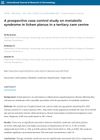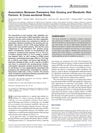 3 citations,
January 2020 in “Indian Dermatology Online Journal”
3 citations,
January 2020 in “Indian Dermatology Online Journal” Skin problems in patients with polycystic ovarian disease are linked to body weight, blood sugar, and hormone levels.
 December 2022 in “Türk biyokimya dergisi”
December 2022 in “Türk biyokimya dergisi” The conclusions are: fecal short-chain fatty acids may help prevent cancer, fiber intake can reduce obesity, weight loss is hard for obese people, low BMI cancer patients are more prone to chemotherapy side effects, intermittent fasting benefits gut health, cherry laurel has health benefits in rats, certain gene variations can increase stress in hair loss patients, fecal acids can affect blood sugar levels, cold agglutinin can affect blood test results in autoimmune patients, and people with Crohn's disease have higher levels of a certain chemical in their blood.
 7 citations,
July 2019 in “Advances in preventive medicine”
7 citations,
July 2019 in “Advances in preventive medicine” Most diabetic patients have skin problems, which are more common with longer diabetes duration and poor blood sugar control.
 6 citations,
January 2020 in “The Aging Male”
6 citations,
January 2020 in “The Aging Male” Testosterone replacement therapy improved blood sugar and fat levels without raising prostate cancer risk in Japanese men with low testosterone.
 February 2022 in “Mediators of Inflammation”
February 2022 in “Mediators of Inflammation” Women with Polycystic Ovary Syndrome (PCOS) have lower levels of a substance called DIAPH1 in their blood, which is linked to changes in sugar metabolism and insulin resistance.
January 2021 in “Menoufia Medical Journal” Women with pattern hair loss often have higher blood sugar, cholesterol, blood pressure, and waist size, suggesting a link between hair loss and metabolic syndrome.
 31 citations,
February 2021 in “Nutrients”
31 citations,
February 2021 in “Nutrients” Curcumin may improve blood sugar levels and cholesterol in people with PCOS, but more research is needed.
 December 2023 in “Benha Journal of Applied Sciences”
December 2023 in “Benha Journal of Applied Sciences” Men with male pattern baldness have higher blood sugar, bad cholesterol, and ZAG protein levels than healthy men.
 5 citations,
June 2018 in “Journal of Diabetes, Metabolic Disorders & Control”
5 citations,
June 2018 in “Journal of Diabetes, Metabolic Disorders & Control” Women with PCOS may have higher bad cholesterol and are at risk for blood sugar issues; lifestyle changes are recommended.
20 citations,
June 2020 in “Journal of Advanced Research” High-dose vitamin A and E with zinc improved blood sugar control and insulin function in diabetics, but may cause hair loss.
 5 citations,
December 2016 in “Journal of skin and stem cell”
5 citations,
December 2016 in “Journal of skin and stem cell” People with cutaneous Lichen Planus are more likely to have Metabolic Syndrome and related conditions like high cholesterol, diabetes, and high blood pressure.

Metformin helps manage weight, blood pressure, and hormonal imbalances in PCOS patients.
 August 2017 in “International Journal of Research in Dermatology”
August 2017 in “International Journal of Research in Dermatology” Lichen planus is not linked to metabolic syndrome, but it is associated with higher rates of high blood pressure, high triglycerides, and low HDL cholesterol.
January 2021 in “Menoufia Medical Journal” People with early-onset androgenetic alopecia may have a higher risk of heart disease due to abnormal blood lipid levels.
 7 citations,
January 2022 in “Evidence-based complementary and alternative medicine”
7 citations,
January 2022 in “Evidence-based complementary and alternative medicine” Ginger supplements helped reduce symptoms and improve metabolic health in hypothyroid patients.
 7 citations,
February 2016 in “Arab journal of urology”
7 citations,
February 2016 in “Arab journal of urology” People with early hair loss may have a higher chance of enlarged prostate and metabolic syndrome, so they should be checked for urinary and metabolic issues.
 5 citations,
January 2018 in “Acta dermato-venereologica”
5 citations,
January 2018 in “Acta dermato-venereologica” Premature hair greying may indicate a higher risk of metabolic problems.
 2 citations,
February 2023 in “BMC endocrine disorders”
2 citations,
February 2023 in “BMC endocrine disorders” Curcumin improved some metabolic factors in women with PCOS but did not affect cholesterol, insulin, or testosterone levels.
 2 citations,
November 2018 in “International journal of gynaecology and obstetrics”
2 citations,
November 2018 in “International journal of gynaecology and obstetrics” Women with different PCOS types have similar fertility treatment results.
1 citations,
January 2018 in “Annals of Medical and Health Sciences Research” People with male pattern baldness are more likely to have metabolic syndrome.
 1 citations,
January 2017 in “International Journal of Research in Medical Sciences”
1 citations,
January 2017 in “International Journal of Research in Medical Sciences” Men with severe hair loss are more likely to have metabolic syndrome, a condition linked to heart disease.

Men with androgenetic alopecia may have a higher risk of metabolic syndrome.
 October 2023 in “Benha Journal of Applied Sciences”
October 2023 in “Benha Journal of Applied Sciences” Insulin resistance may contribute to hair loss in people with androgenic alopecia.
 June 2022 in “Biomedical reports”
June 2022 in “Biomedical reports” STK11 gene variations do not predict how well metformin will work for PCOS, but may affect hair loss and excess hair growth.
December 2021 in “Benha Journal of Applied Sciences” Higher Alarin levels may predict androgenetic alopecia and metabolic syndrome.
December 2020 in “Benha Journal of Applied Sciences” Osteopontin levels are higher in people with androgenetic alopecia and are linked to metabolic disorders.
 July 2015 in “Egyptian Journal of Dermatology and Venereology”
July 2015 in “Egyptian Journal of Dermatology and Venereology” People with androgenetic alopecia, both men and women, are more likely to develop heart diseases in the future.
 18 citations,
July 2001 in “Australian veterinary journal”
18 citations,
July 2001 in “Australian veterinary journal” A cat with skin bumps and itching had high blood fats and skin infections, which improved with diet and medication changes.
 15 citations,
June 2018 in “Life Sciences”
15 citations,
June 2018 in “Life Sciences” Diabetex improves diabetic wound healing better than metformin.
 January 2019 in “Current research in diabetes & obesity journal”
January 2019 in “Current research in diabetes & obesity journal” A woman with type 2 diabetes developed alopecia areata, suggesting a link between the two autoimmune conditions.























